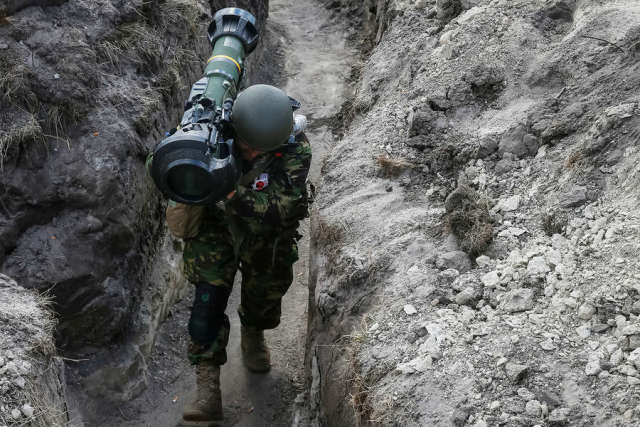Political scientist Volkov: Russia's assets in the US and the EU can be used to buy military equipment for the Armed Forces
The countries that are members of NATO have come to an "unspoken agreement" to refuse to supply Ukraine with certain types of weapons, the German DPA news agency reported. What weapons the alliance does not want to supply to the APU and under what circumstances this situation may change - in the material of "Gazeta.Ru»
According to DPA, NATO countries have adopted a kind of "tacit agreement" not to supply a number of types of modern weapons and military equipment to Ukraine. This is due to the fact, according to sources at the alliance headquarters, that NATO "is afraid to remain unarmed in the event of a possible direct military clash with Russia." At the same time, the sources emphasize, this is supposedly only a "temporary solution".
"There is a risk that the supply of tanks and aircraft to Kiev may provoke a response from Moscow. In addition, a number of NATO countries fear that they may find themselves without the support of other alliance members in the event of an attack," the DPA interlocutor claims.
At the same time, the Czech Republic stated that there is no agreement in the NATO countries that heavy military equipment will not be delivered to Ukraine. This was told by the head of the Czech Defense Ministry, Yana Chernokhova. "There is no such agreement, at least I don't know anything about it," she said.
Sergei Belousov, a member of the Board of Military Experts, believes that some countries of the North Atlantic Alliance are "close to the border, beyond which they have a shortage of weapons."
"There is a direct analogy with the current Ukrainian refugees in Europe, who demand food and clothing, and the Ukrainian government, who want new supplies of weapons and ammunition - they want to get it all for free. The generosity of the West, as it turned out, has its limits," says Belousov.
"As a result, Kiev received the Javelin ATGM and large-caliber Barret sniper rifles, two decommissioned Coast Guard boats. With the beginning of the military operation, the situation changed, but again, Ukraine for the most part began to receive either more Soviet armored vehicles, or those weapons that do not help change the nature of hostilities. The AFU has not received new heavy weapons in three months of operation," Belousov said.
Retired Air Force Major General Valery Koval believes that NATO's refusal to supply heavy equipment was "predetermined".
"The situation was indicative when Kiev asked to create a no-fly zone, but was refused. This meant that NATO had red lines beyond which the bloc would not cross. Obviously, there are some unspoken agreements. Moscow, for example, still does not hit the control centers in Kiev, Ukraine does not attack the gas transportation system. Within the framework of these unspoken agreements, most likely, there is also an item on heavy equipment. If the equipment is delivered, then Moscow, for example, can attack railway interchanges not in a single way, as it is now, but en masse," Koval is sure.
The general also noted that even obsolete combat aircraft were not delivered to Kiev, although a significant part of the Ukrainian Air Force was destroyed in the first weeks of the military operation.
"Poland wanted to help, having expressed its readiness to transfer its MiG-29 fighters to Ukraine, but Warsaw had a selfish interest in getting more modern American planes instead of these old Soviet ones. The deal was refused, and the Poles closed the topic of supplies," Koval said.
In turn, military expert Vladislav Shurygin believes that the supply of heavy, but not the newest military equipment is possible if an "adequate business solution" is found and Western countries are "guaranteed to receive money."
"The same Germans are in no hurry to send Leopard tanks and Cheetah installations. At the same time, they are talking about deliveries not through the German government, but about paying directly to manufacturing companies. Kiev has nothing to pay with right now, even grain stocks are running out. Long-term loans will not be considered, because there is no guarantee of payment of bills. But foreign property of Ukraine is considered as assets that can be secured," Shurygin said.
Military political analyst Valery Volkov added that there is also an "extreme payment option."
"Russian gold and foreign currency reserves, blocked in the United States and other countries, can be used to pay for this military equipment. The West wants to force Moscow to pay for the weapons it supplies to Ukraine. It is clear that this is dangerous, that it will cause the harshest reaction in the Kremlin, and so far the West is not taking such a step. But he is definitely considering it," Volkov summed up.
Victor Sokirko



